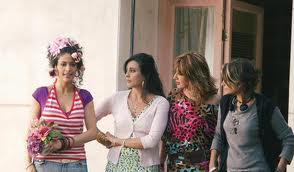 Caramel depicts the friendship between five women—three young women working at a beauty parlor in a poor neighborhood of Lebanon’s capital Beirut, a middle-aged starlet customer, and an elderly tailor woman—and each of their love stories. This beauty parlor friendship is reminiscent of the American film Steel Magnolias and it captures a woman’s point of view well. Why does a beauty parlor become the setting of the story of friendship between women?
Caramel depicts the friendship between five women—three young women working at a beauty parlor in a poor neighborhood of Lebanon’s capital Beirut, a middle-aged starlet customer, and an elderly tailor woman—and each of their love stories. This beauty parlor friendship is reminiscent of the American film Steel Magnolias and it captures a woman’s point of view well. Why does a beauty parlor become the setting of the story of friendship between women?
First, a beauty parlor is a place just for women. With the absence of men, the women who usually exercise restraint around men can express their true feelings. Usually devoted to their parents, husband, and children, this place is where women are the center of attention as a customer. Also, a beautician is not managed by a male boss and is valued for her specialized skills. Furthermore, since the female customers of this place must expose their flaws that they normally conceal—wrinkles, blemishes, grey hairs, or thinning hair—they do not feel like they have to conceal their own private life, weaknesses, and worries anymore to the beautician who knows their flaws; perhaps they can share their true feelings and a sisterhood may develop.
 While Japanese women also believe that “the hair is the life of the woman,” it seems that Middle Eastern women especially believe in this. When I started living in America, I attended an English class where there were women from different foreign countries. There was another Japanese woman—pretty, young, and with long hair—as well as some women from the Middle East—Egypt, Iran, etc. One day, when the Japanese woman began to say, “My hair care method is…” the Middle Eastern women, who until then seemed bored holding their children and uninterested in the conversation, suddenly get up from the sofa and practically cast their children aside, scooting closer to the Japanese woman to ask, “Please tell me your secret!!” In the end, her secret to beautiful hair was to eat seaweed every day, to which everyone responded, “Oh…” with a look of disappointment. Even now, I remember how the light of their eyes full of lively curiosity quickly faded.
While Japanese women also believe that “the hair is the life of the woman,” it seems that Middle Eastern women especially believe in this. When I started living in America, I attended an English class where there were women from different foreign countries. There was another Japanese woman—pretty, young, and with long hair—as well as some women from the Middle East—Egypt, Iran, etc. One day, when the Japanese woman began to say, “My hair care method is…” the Middle Eastern women, who until then seemed bored holding their children and uninterested in the conversation, suddenly get up from the sofa and practically cast their children aside, scooting closer to the Japanese woman to ask, “Please tell me your secret!!” In the end, her secret to beautiful hair was to eat seaweed every day, to which everyone responded, “Oh…” with a look of disappointment. Even now, I remember how the light of their eyes full of lively curiosity quickly faded.
 To Japanese people, all Arab countries and the Middle East are seen as more-or-less the same and there is the image that women conceal their body and wear a veil, but Middle Eastern countries each have their own unique culture and history. Turkey and Iran certainly possess their own long-lasting traditions and refined culture, but so does Lebanon. Overlooking the Mediterranean Sea, Lebanon trades with countries in both northern Africa and southern Europe and there have been many Christians there from ancient times; also, Lebanon was under French control in recent years so formed strong relations with southern Europe. In particular, since this movie’s protagonists are Christian, they do not have to wear a veil and display their beauty freely.
To Japanese people, all Arab countries and the Middle East are seen as more-or-less the same and there is the image that women conceal their body and wear a veil, but Middle Eastern countries each have their own unique culture and history. Turkey and Iran certainly possess their own long-lasting traditions and refined culture, but so does Lebanon. Overlooking the Mediterranean Sea, Lebanon trades with countries in both northern Africa and southern Europe and there have been many Christians there from ancient times; also, Lebanon was under French control in recent years so formed strong relations with southern Europe. In particular, since this movie’s protagonists are Christian, they do not have to wear a veil and display their beauty freely.
In addition, people tend to think of Lebanon as a country of war. This is historically true and there was a war between Lebanon and Israel in 2006, around the time this movie was made. However, there is no hint of war in this movie at all. The beautiful Nadine Labaki played the lead role in, wrote the screenplay for, and directed this movie. Her intention was, “I don’t want people to merely see Lebanon as a country of war. Just like other humans, we have ordinary lives with the struggles of love that anyone encounters. I want people to see us as we truly are.” Certainly in this movie, there are common worries for women such as adultery, the fear of growing old, the pressure from society to be chaste, yearning romantically for other women, the obligation of having to care for their family, and anxieties over their marriage. However, the uniqueness of the Lebanese women in this movie can be seen in the background; they fear that war may reach their streets again at any time and, as Christians living among Muslims, they are tangled between European culture and Muslim culture.
The Phoenicians were Lebanon indigenes who invented the Phoenician alphabet that became the basis for the Hebrew, Greek, and Arabic alphabets. After that, this area was conquered by Arabians from the east in the 7th century. Afterwards, this area gained autonomy from the ruling Ottoman Empire, and Christianity from the west was also influential. After Turkey was defeated in World War I, this land became a mandated territory of France due to the Sykes-Picot Agreement. France ruled over Tunisia and Algeria with considerable difficulty, but ruled easily over Christian countries like Lebanon. This mandate ended in June 8, 1941 and was followed by Lebanon’s Declaration of Independence. This independence received support from the United Kingdom and was peaceful. Afterwards, Lebanon entered international markets in areas such as financing and tourism and there was rapid economic growth; Lebanon’s capital Beirut did well as a resort and became known as the “Paris of the Middle East.”
In Lebanon, Christians and Muslims somehow managed to maintain a balance of power, but this balance collapsed when their neighbor Jordan expelled the Palestinian refugees being sheltered in Jordan, causing Palestinian refugees and PLO extremists to pour into Lebanon in great numbers. Civil war broke out in 1975, and in 1982, the Israeli army, allied with the Christians in Lebanon, invaded Lebanon. Israel, faced with resistance from Hezbollah—a radical party supported by Syria and Iran—and opposition from international public opinion, eventually withdrew from Lebanon in 2000; afterwards, though, chaos continued in Lebanon with a complicated four-way factional conflict between a pro-American faction, a pro-Syria faction, a pro-Hezbollah faction, and an anti-Hezbollah faction, and the nation became exhausted. In 2006 when this movie was made, Israel was angry with the terrorist activities of Hezbollah and attacked Lebanon, which resulted in the 2006 Lebanon War. Eventually, Israel accepted the ceasefire resolution from the United Nations Security Council and withdrew, and the strength of Syria’s control over Lebanon became stronger.
Director Nadine Labaki’s standpoint of, “I am not political,” is persistent throughout this whole movie. However, she became famous suddenly for this movie that was a big hit internationally and she was chosen as one of the top 5 women in Arabian Business magazine’s “Top 100 Most Powerful Arabs” so she is no longer able to keep the standpoint of, “I am not political.” After that, she made Where Do We Go Now? which depicts the conflict between Christians and Muslims in Lebanon. I think I want to write a different entry about this movie.
